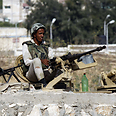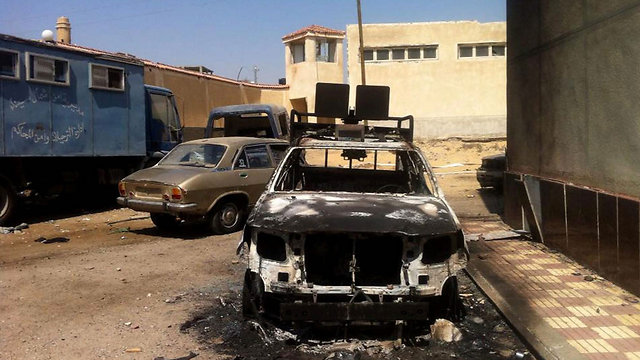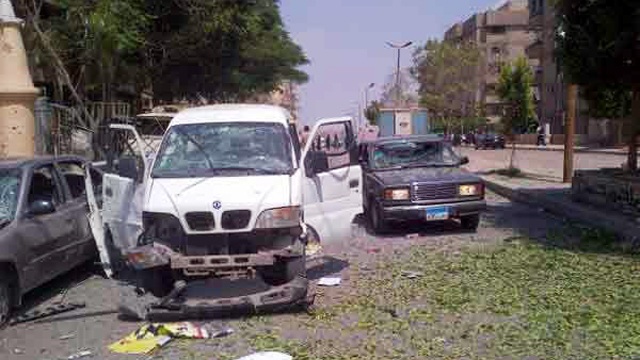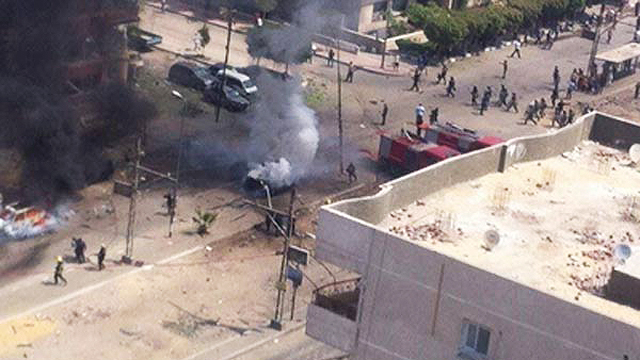
Egypt tightens Sinai security, assesses militant threat
Radical group takes responsibility for Cairo suicide bombing targeting Egypt's interior minister, prompting Egyptian security forces to renew Sinai terror cleansing operation. Anti-Morsi protest leader's car fired on in Cairo
Egypt has tightened control of crossings from the Sinai after an Islamist militant group based in the peninsula said it tried to kill the interior minister in Cairo last week, the state news agency reported on Monday.
Meanwhile, gunmen on Monday opened fire on the car of the co-founder of a movement that helped bring down Islamist President Mohamed Morsi. The Tamarud movement's website said Mahmoud Badr was unharmed in the attack. It was not clear whether it was criminal or a political act.
Related stories:
- Alliance with Israel growing out of Egyptian security chaos
- Egyptian troop column moves into the Sinai
- Egypt's interior minister survives bomb attack
Ansar Bayt al-Maqdis an al-Qaeda-inspired militant group, claimed responsibility on Sunday for the suicide bombing, and promised more attacks in revenge for a crackdown on Egypt's Islamists, raising fears that militant violence in the Sinai could spread across Egypt.
The claim could not be independently verified but it appeared on militant websites that regularly distribute statements from al-Qaeda-linked groups. If true, it would mark the first time Sinai militants took their fight into the heart of the Egyptian capital with a suicide attack.

Bombed Egyptian security vehicle (Photo: EPA)
Tourist resorts along the southern coast of the rocky, desert region saw a string of suicide bombings in the mid-2000s that left at least 125 people dead and triggered mass arrests and detentions of thousands of Bedouin tribesman. The crackdown soured relations between locals and the central government, intensifying the Bedouins' feelings of mistreatment and turning the northern end of the peninsula into an incubator for Islamic extremism.
Generally, Islamist militancy has risen sharply in the relatively lawless region adjoining Israel and the Gaza Strip and elsewhere in Egypt since the army deposed Islamist President Mohamed Morsi two months ago, following mass protests.
Thursday's daylight attack was easily the most spectacular so far. A suicide car bomber blew himself up next to Interior Minister Mohamed Ibrahim's convoy as he left his Cairo home for work in an armored limousine. The bomber, a passer-by and an unidentified person were killed and more than 20 wounded.

Scene of blast targeting Minister Gen. Mohammed Ibrahim
In the statement posted late Sunday, the group said it carried out the attack on Interior Minister Gen. Mohammed Ibrahim's motorcade to avenge Muslims killed by security forces during their violent Aug. 14 dismantlement of two sprawling encampments set up in Cairo by pro-Morsi supporters demanding his reinstatement.
"The Interior Ministry, the slaughterer, has seen death with its own eyes from a martyrdom operation carried out by a lion of Egypt's lions," the statement said. "What is coming will be worse," it added.
"We pledge to God the Almighty to seek revenge for Muslims on all those who contributed to their killings and assaulting their honor, above all al-Sisi and Mohammed Ibrahim," it said, also referring to Egypt's Military Chief Gen. Abdel-Fatah al-Sisi who led the ouster of Morsi after millions took to the streets demanding his resignation for abuse of power.

The statement urged Muslims to stay away from the ministries of interior and defense, indicating that these two institutions will be targeted.
It also showed an ideological proximity to al-Qaeda, citing an Aug. 3 statement by the group's leader, Ayman al-Zawahri, that mocked the democratic process and called upon "soldiers of the Quran to wage the war for the Quran," the Muslim holy book.
Security officials said they were assessing the threat posed by the group, which is said to have 700 to 1,000 members and is considered the second largest jihadist group in Sinai after Salafiya Jihadiya, with its estimated headcount of around 5,000.
Some officials doubt Ansar Bayt al-Maqdis is capable of attacks outside Sinai.
Security officials told Reuters they were especially concerned that Ansar Bayt al-Maqdis, which means "supporters of Jerusalem", will carry out car bombings with stolen government vehicles.
The state news agency MENA said that Ibrahim had decided to issue orders to boost security surveillance and tighten control of crossings from the Sinai to other Egyptian regions to coincide with a broad security campaign in the peninsula.
Ansar Bayt al-Maqdis counts Grad rockets among its weapons and produces homemade bombs used against Egyptian security forces and soldiers, security sources said. Rocket-propelled grenades are often fired at buildings housing security forces.
Last year the same group claimed responsibility for rocket attacks launched on Israel from Sinai.
It has also claimed at least 10 attacks in the past two years on a gas pipeline linking Egypt, Israel and Jordan.
On Saturday the Egyptian army launched an offensive against Islamist militants near Sheikh Zuweid in North Sinai. The troops deployed dozens of tanks as well as armored vehicles and attack helicopters, killing at least nine militants and arresting nine suspects, security officials said.
The army however has targeted several other Islamic militant groups in its current operation as well.
In northern Sinai, mobile phone networks, land-lines and the Internet were down early Monday as military operation against militant hideouts in the southern town of Rafah resumed, according to a military official, who spoke on condition of anonymity because he was not authorized to speak to the press.
Besides those killed and captured in the operation, a number of suspects have fled to coastal villages or tried to enter Gaza through underground tunnels.
Sinai's eastern border with Israel and Hamas-controlled Gaza is a particularly sensitive one, and Israel made its concerns known when jihadist groups expanded into a security vacuum left by the fall of Egypt's veteran autocrat Hosni Mubarak in 2011.
Since the army toppled Morsi, and especially since security forces killed hundreds of Islamists when they smashed protest camps in Cairo on Aug. 14, there have been online calls from radicals to abandon attempts to achieve Islamist rule by democracy, and instead step up violence.
Security concerns are not limited to the Sinai.
A week ago, militants fired rocket-propelled grenades at a ship passing through the Suez Canal on the Sinai's western edge, vital to world trade as well as Egypt's depleted state finances. A video was released linking them to the al-Furqan group.
The Associated Press and Reuters contributed to this report
- Receive Ynetnews updates directly to your desktop










